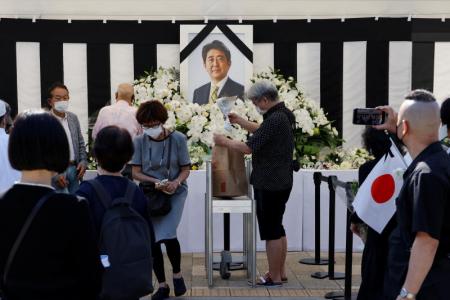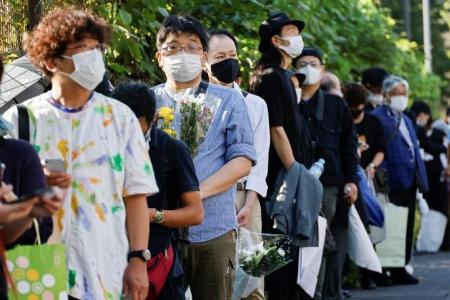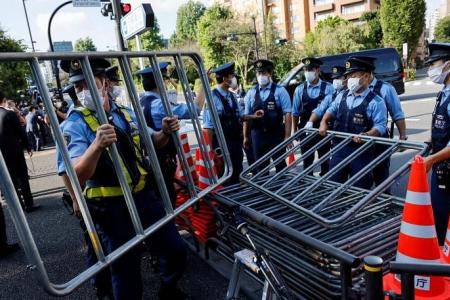Japan gives former PM Shinzo Abe a final send-off
TOKYO - Former Japanese prime minister Shinzo Abe, a giant in diplomacy yet controversial at home, will be given a final send-off in a state funeral to be attended by about 4,300 guests, including 700 from abroad, on Tuesday.
The event will begin at 2pm (1pm in Singapore) at the Nippon Budokan arena that has also hosted Olympic events, but is also a stone's throw from the Yasukuni Shrine that is seen as a symbol of its wartime history.
Public wreath-laying stands have been set up at the Kudanzaka Park directly outside the venue, with members of the public allowed to lay wreaths from 10am to 4pm.
Security across the capital is watertight to avoid the blunders that led to Mr Abe's assassination, with tens of thousands of police officers from across the country congregating in Tokyo to provide support.
The idea of a "state funeral" is by itself highly divisive, even if Japan was united in shock in the immediate wake of Mr Abe's death. He was killed by a lone gunman who used a homemade firegun out of anger over the leader's alleged ties with the Unification Church, a South Korean-based outfit with supposedly coercive tactics that have bankrupted and broken up families.
Legal experts argue that the state funeral is unconstitutional, a relic of the imperial era supreme law.
This is only the second time in post-war history - since one for former PM Shigeru Yoshida in 1967 - that a state funeral is held. Former PM Eisaku Sato, Japan's second-longest serving postwar premier and the only one to have won a Nobel Peace Prize, was not accorded the honour.
Political experts argue that Prime Minister Fumio Kishida had, by deciding on the event within his Cabinet without going through a Diet debate, flouted protocol.
Ordinary Japanese are divided, with polls showing at least six in 10 against the "state funeral", held 81 days after Mr Abe died, and the expense of a whopping 1.66 billion yen (S$16.5 million) to remember him.
In acknowledgement of the differing opinions among the public, Mr Kishida's government has said that nobody will be forced to mourn Mr Abe.
Tuesday has not been declared a public holiday and schools are not being asked to close. Local governments have not been requested to fly the national flag at half-mast.
Two warring movements have broken out on social media.
One hashtag, of respect, reads, "Abe-san arigatou" (Thank you Mr Abe), with a link to an online digital flower offering site for those to remember the slain prime minister. More than 191,000 signatures have been gathered as of 7.30am on Tuesday on the website http://offering-flower.com
Another, of anger, reads, "I will protest the state funeral until the final moments".
A protest, with the involvement of activists such as 33-year-old Nahoko Hishiyama, has been organised outside the National Diet Building that will begin at 2pm - the same time as the state funeral.
Calls to disregard the minute of silence by creating a loud ruckus have, however, been lambasted online as "a disgrace" and "a sign of poor character and upbringing, regardless of what one thinks of the state funeral".
Mr Kishida, meanwhile, is embarking on what he has termed "condolence diplomacy" by holding a series of back-to-back revolving door summit meetings with visiting world leaders.

Among the top-level leaders in attendance are Singapore Prime Minister Lee Hsien Loong, Australian Prime Minister Anthony Albanese, and Indian Prime Minister Narendra Modi.
Most meetings last just 20 minutes; Mr Kishida also hosted a dinner reception for visiting United States Vice-President Kamala Harris on Monday.
Some 218 countries, regions and international organisations will be represented at the state funeral, though a majority by ministerial or ambassadorial level representatives or former leaders.
Offering his condolences in a public message, Mr Takeshi Niinami, chief executive of homegrown beverage giant Suntory, remembered Mr Abe for his outstanding leadership, his "vivid and challenging vision collectively known as Abenomics", and for transforming "the way people around the world looked at the world map" with the phrase, Free and Open Indo-Pacific.
"The loss of a leader with the power of words that resonate not only in Japan but throughout the world is a great loss for our country, and I cannot help but regret it," Mr Niinami said.
Get The New Paper on your phone with the free TNP app. Download from the Apple App Store or Google Play Store now




